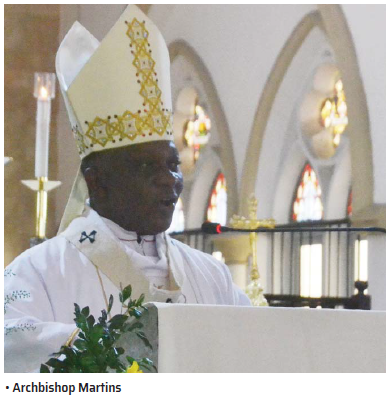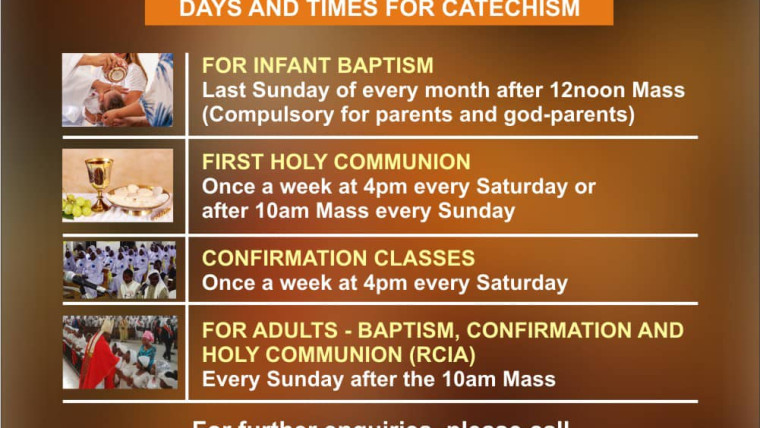Most Rev. (Dr.) Alfred Adewale Martins, Archbishop of the Metropolitan See of Lagos has charged Nigerians to shun religious, political and ethnic differences and collectively seek and strive for peace at a period he described as “challenging times of turmoil and tranquillity.” He, recently, said this in his pastoral letter entitled “Seeking and striving for peace in turbulent times: A pastoral letter calling people to faith and action,” addressed to Priests, Religious, and Lay Faithful of the Archdiocese of Lagos, as well as all who work for Peace and Justice.
The prelate acknowledged the challenging time Nigeria is facing in terms of unrest, discord, and disturbance which have jeopardised the very essence of the peace; emphasising that in the face of this turbulence, Nigerians should uphold unwavering commitment to peace as a beacon of hope. Archbishop Martins said, “This pastoral letter is not mere ink on parchment; it is an invitation to introspection, a clarion call to develop a roadmap and plan of action that will lead to the serenity we earnestly seek as we begin a new calendar year. “We must journey together, hand in hand, as we explore pathways to peace upon which our community, our city, and our nation shall attain the desired peace. “In John 20:19, following His resurrection from the dead, Jesus’ first words to His disciples were “Peace be with you.”
Peace, a gift that Christ ensured His disciples embraced and disseminated wherever they went. Indeed, peace is a sacred and invaluable gift that we are called to pursue and nurture actively. “Peace is not a passive state, but an ongoing and dynamic process that demands perpetual attention and constant effort to attain and maintain. It is a virtue we must cultivate within ourselves and our communities, recognising that only when we are at peace within that we can effectively labour for peace in the world.” The pastoral letter read in parts, “In the rich tapestry of our nation, well-known for its diversity, we find ourselves immersed in the splendour of various cultures, yet grappling with the challenge of social fragmentation. “Despite our interconnectedness, ethnic tensions persist, casting shadows on our collective peace.
These tensions, fuelled by misunderstandings and historical complexities, obstruct the harmony within our local communities, presenting pockets of discord that, if unchecked, could develop into more significant conflicts. “Winds of political unrest blow very strongly, disturbing the tranquility we yearn for. Governance challenges and power struggles leave an indelible mark on our societal fabric, hindering the path to stability and peace. Corruption, inefficiency, and a lack of transparent leadership cast doubts upon our shared aspiration for peaceful coexistence.” He condemned quest for inordinate wealth which has driven many to corrupt practices as he lamented the hardship. Hear him, “The unbridled pursuit of wealth and power compounds the situation, making it more detrimental to the welfare of people. “Economic disparities, an unfortunate reality in our time, stand as towering barriers to the serenity we desire.
The cost of living is advancing northwards relentlessly and the growing gap between the privileged and the disadvantaged is breeding more and more discontent, and eroding the foundations of a harmonious society.” Archbishop Martins cited unemployment and lack of opportunities as the two top reasons for spate of armed robbery, kidnappings and other criminalities. According to him, the perpetrators do these to revenge unemployment. His pastoral letter further read, “The lack of opportunities, coupled with the pressing issue of unemployment, perpetuates a cycle of frustration that can very easily become a monster that will continue to prevent the peace that we are striving to uphold.
This is evident in the rise of cases of armed robbery, kidnapping, fraud, and a pervasive feeling of insecurity that casts a pall over our daily lives, jeopardising not only our physical safety but also the essence of peace within our homes and neighbourhoods. The high-ranking cleric itemised the events that have disrupted our peace in recent times. Events such as the EndSARS saga in 2020, the fanaticism and intolerance that led to the tragic murder of Deborah Samuel, the kidnap and murder of priests and religious, the ongoing attack of local communities by groups of bandits, especially in the middle belt of the country, with the most recent ones being since the eve of Christmas, 2023 in Plateau State; the activities of the so-called unknown gunmen disturbing the peace and development in the South East, the Owo massacre, the bombings of Churches, the murder of Stephen Ngofe Na’aman of Kafanchan Diocese, the kidnap and murder of Michael Nnadi, the carelessness on the part of security officials that led to the death of innocent victims in Kaduna state recently, and a myriad of other worrisome instances.
“All of these are sad and condemnable, but they also remind us of our duty to strive for peace. So, we are challenged to seek the best option in the face of all these challenges. That is, we must work collectively towards a more harmonious society as we seek and strive after justice and peace,” the prelate stated. He explained, “Working towards peace necessitates being immersed in the life of our communities and practicing patience, tolerance and forgiveness in our daily lives.
Creating communities of peace where everyone is welcome and accepted, supporting organisations that promote peace, speaking out against violence and injustice, and striving for a more just society with equal access to basic necessities are vital steps. No action is insignificant or too small; every effort makes a difference.” Archbishop Martins noted that the similarities between Christianity and Islam in basic beliefs of love, compassion, and forgiveness should serve as unifying elements for fostering peaceful co-existence. In his words, “Our faith, whether Christian, Islam, or rooted in tradition, unites us through their teachings on love, compassion, and forgiveness. These shared values serve as common grounds, urging us to embrace one another despite our diversity. When we come together guided by the values of our faiths, we find a resonance that goes beyond the discordant notes of our differences.

Hope becomes the catalyst for transformation, fostering an unwavering belief in the possibility of a brighter tomorrow where peace reigns supreme. “Our faith-based communities stand as beacons of hope and moral guidance, possessing collective strength to foster peace within our city and beyond. Let us gather not only in our places of worship but also in shared spaces of understanding and dialogue, where our faiths converge in pursuit of a singular goal: peaceful coexistence.”
He however urged all Nigerians to kickstart the year, 2024, placing peace at the forefront of their daily actions, stressing that everyone should commit to playing his or her part to creating a more peaceful world. On a final note, the Archbishop prayed, “Like St. Francis of Assisi, I pray that the Lord would make us instruments of peace. May the Lord bless our efforts, and may we all find peace in our hearts and lives as I commend you all to the maternal care and intercession of our Blessed Mother Mary, the Queen of Peace.”
… Laments Plateau massacre
Says enough of this carnage!
In another vein, Most Rev. Alfred Adewale Martins, Catholic Archbishop of Lagos has said that the renewed wave of killings and kidnappings in Plateau State and other parts of the country by terrorists, suggests that the government is gradually losing the battle against insecurity. He warned that failure of the security agencies to urgently bring the culprits to book and secure the lives of Nigerians, particularly the recent killings in Plateau and Kaduna States, may leave the hapless citizens with no better option but to resort to self-help to protect their lives and properties.
The Prelate was reacting to the killings on the eve of Christmas and the recent protest walk being embarked upon by some religious leaders and citizens of Plateau State to express their sorrow and anger at the inability of government and security agencies to protect them from the unprovoked killing of their kith and kin by gun-trotting terrorists. He said that the only way to assuage the anger and disappointment of the people is to identify the culprits and their sponsors and ensure they are made to face the law.
“We must first of all extend our condolences to the families that have suffered from the attacks as we pray the Lord to grant eternal rest to the dead and consolation and healing to those they have left behind. The heart of everyone with human feelings must bleed as we watched the corpses of innocent citizens lined up and buried in mass graves after being hacked down by heartless people who have been operating with impunity in many communities. “The killings have continued because there has not been any repercussion on those who carry them out.
All we see after each round of killing is government officials condemning the killing and promising that the perpetrators would be brought to book. The cliché is beginning to sound like a broken record and people take such promises with a pinch of salt because no one has actually heard of an one being taken to court or convicted for such heinous crimes. “This cannot be allowed to go on. The people who are victims of these crimes want to see real action taken to bring justice to their dear ones.
Peoples’ anger can be assuaged only if those found culpable are brought to book. “We want to know who are the perpetrators and all those who sent them on these inglorious missions. Until these are done the general impression would seem like the culprits are being shielded by powerful forces in and out of government circles. Reacting to the insinuation that the killings were targeted mainly at Christians, the Archbishop said, “If the killings happen in areas that are predominantly Christian in population and there are no efforts made to arrest the situation, as is the case today, people would feel entirely justified to come to such a conclusion. So, government and security agencies have the duty of proving them wrong by ensuring that no stone is left unturned in bringing the perpetrators to book and restoring the confidence of people that they would be protected wherever they chose to live and whatever religion they choose to practice.
“I believe that there is no true religion that supports or preaches such atrocious shedding of innocent blood even if some of their adherents abuse their religion in that way. The onus therefore, also lies on true believers and their leaders to denounce such killings and take proactive steps to bring such mindless killing to an end.” He further said, “The consequences of religious discord are very grave and so leaders of all religious groups must do all that is necessary to help bring these atrocities to an end. I believe NIREC also has a big role to play in dealing with such matters that breed suspicion and are very divisive.”



